Dentures - Auburn, ME
The Simple, Quick Way to Replace Lost Teeth
If you have suffered extensive tooth loss, you might be thinking about getting dentures to rebuild your smile. You have much to look forward to! This type of dental prosthetic can provide a sturdy bite, natural-looking aesthetics, and numerous other advantages. On this page, you will learn more about dentures, how they work, and how they might be able to help you. When you are ready to talk to an expert about replacing your lost teeth, contact the team at Willow Run Dental Association.
Who Is a Good Candidate for Dentures?

Dentures are an excellent tooth replacement option for many people who have suffered substantial tooth loss. When you come in for your consultation, we will learn about your oral health and your goals for treatment before we recommend a plan to optimize your smile’s wellness, function, and appearance. If you are not a good candidate for dentures right away, you may become one after some preliminary treatments, such as gum disease therapy or other restorative procedures.
Effects of Missing Teeth

Missing teeth may be the result of genetics, gum disease, traumatic accidents, decay, or a range of other factors. Regardless of why you are edentulous (missing all your teeth), your condition may have profound negative consequences for your daily quality of life.
For example, you might experience:
- Self-consciousness about your appearance. A toothless smile and sagging cheeks might make you feel embarrassed, which could cause you to shy away from social situations.
- Speech challenges. Missing teeth can make it difficult to properly enunciate certain sounds.
- Nutrient deficiencies. Edentulism can limit your food choices and may contribute to certain nutrient deficiencies. You may also get less enjoyment from your food than you used to.
What Qualifies You for Dentures?
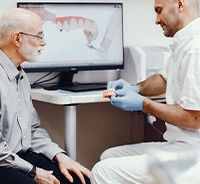
You may qualify for dentures if:
- You are missing all or most of your teeth throughout one or both of your dental arches.
- Your gums and jawbone are healthy enough to support a prosthetic. (If we find concerns about your oral health, we may be able to address these before providing dentures.)
- You are looking for a cost-effective way to rebuild your smile.
- You have good habits, including a commitment to oral hygiene, that will support your dentures’ long-term success.
Alternative Tooth Replacement Options
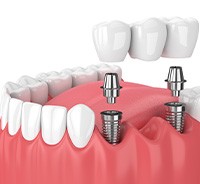
If traditional dentures are not quite right for you, we may recommend an alternative tooth replacement option, such as:
- A fixed dental bridge. Fixed bridges get attached to the natural teeth that surround the site of a missing tooth. They are sturdy, long-lasting, and can look very nice. Their biggest disadvantage is that they require significant modification of the supporting teeth.
- Dental implants. Implants are prosthetic tooth roots, which we surgically place into the jawbone. They can support crowns, bridges, and dentures. We often encourage patients to choose dental implants because they are stronger and offer more oral health benefits than traditional dentures. In fact, they are the gold standard of tooth replacement options!
What Are Dentures?
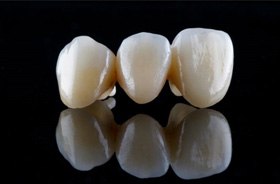
There are a few different types of dentures:
- A full denture is a removable prosthetic that consists of a gum-colored base that supports an entire arch of artificial teeth. The teeth are usually made out of acrylic or porcelain. Natural suction or a special type of adhesive helps a full denture to stay in place.
- A partial denture replaces multiple teeth at various places throughout a dental arch. Small metal attachments help it to remain secure in the mouth.
- An implant-supported denture is anchored in the jawbone via a number of small prosthetic tooth roots.
How Do Dentures Work?

Your process for getting dentures will depend on a few factors, including the extent of your tooth loss and whether you require any preparatory treatment prior to receiving dentures. For example, some individuals must get one or more teeth extracted before they can get dentures.
After your mouth is ready to support dentures, our team will take impressions of your mouth and carefully design your prosthetic teeth. We will pay great attention to detail so that their size, shape, and color complement your natural facial characteristics. After a dental laboratory creates your dentures, we will coach you on how to use them to your greatest advantage.
Indications for Dentures

You may be a candidate for dentures if:
- You have lost all or most of your natural teeth
- Your remaining teeth suffer from constant toothaches or they feel loose
- Your gums are red and swollen
- You have an old denture that no longer fits well
Benefits of Dentures

Non-implant dentures come with numerous benefits, including:
- They are a cost-effective way to replace many teeth
- They can look quite natural
- As long as they fit well, they can provide a sturdy bite that enables you to eat most foods
- They can last for several years before replacement is necessary
Implant-supported dentures come with even more extensive benefits. For example, their fit will never change. They also support jawbone health.
Understanding the Cost of Dentures

The cost of your denture will depend on which type of prosthetic you receive and other factors. Our team will be sure to give you a frank estimate for the price of your care. We will also help you file insurance claims and explore financing options if necessary. We want to make the process of paying for your denture as stress-free as possible.
Factors that Affect the Cost of Dentures

Some factors that affect the cost of dentures include:
- Preparatory treatments. Some patients require tooth extractions, gum disease treatment, or other services before they are able to receive dentures.
- The base of dentures is usually made out of acrylic, and the teeth are typically constructed out of acrylic or porcelain. The quality of the materials used can affect price.
- The type of denture. Full dentures, partial dentures, and implant dentures all come at different price points.
Keep in mind that “bargain” dentures are usually too good to be true. You may end up with a product that you are not satisfied with. It is best to invest in quality care straight from the outset.
Are Implant Dentures More Expensive?
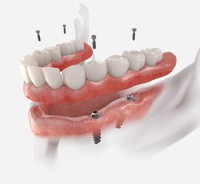
Yes, implant denture cost significantly more than traditional dentures. This is logical because implant dentures require a longer and more complex treatment process, as well as premium materials.
Are implant dentures worth the price? For most patients, yes. They are glad to have the strong bite force and reliable function that is difficult to find with other forms of tooth replacement. Plus, implant dentures last much longer than traditional dentures, which may need to be replaced every 4 – 8 years. In fact, dental implants have the potential to last a lifetime. They are an excellent monetary value.
Does Dental Insurance Cover Dentures?

It is common for dental insurance to cover dentures. They are usually categorized as a major service, meaning that around 50% of their price may be covered, up to the amount of a policy’s annual maximum. Our practice proudly accepts many forms of insurance, and we are in-network with most major policies. We will be pleased to help you understand your benefits and use them in the most advantageous way possible.
Other Options for Making Dentures Affordable

Beyond insurance, there are a few provisions that may make it easier for you to afford your new teeth:
- Essential Dental Plan. This discount plan is designed for patients without insurance. Signing up is easy, and you can enjoy reduced fees on virtually all the services available in our practice.
- We accept CareCredit, a third-party lender that offers low-interest payment plans for dental services. The application process is fast, and most patients are approved for an affordable installment arrangement.
Would you like to learn more about dentures and their cost? Contact our Auburn, ME, dental practice today to schedule your consultation. We are eager to serve you!
Dentures Aftercare

If you take good care of your dentures, they have the potential to provide you with reliable function and confident smiles for years! One thing that you must do to keep them in good shape is regularly visit your dentist. During these checkups, our team can examine your mouth and look at your dentures to identify signs of damage and wear. When necessary, we can adjust your prosthetic and give you personalized tips for at home care.
What else should you do to take good care of your replacement teeth? You will find some helpful tips below.
Removable Dentures
Remove After Eating
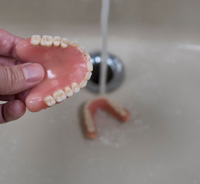
It is wise to remove your dentures after each meal so you can rinse both them and your mouth. This helps to clear away food particles and bacteria that might otherwise accumulate and start to cause odors and stains. When you are rinsing your dentures, be sure to use cool or lukewarm water. Hot water could actually warp your prosthetic and change the way it fits.
Clean Your Restoration
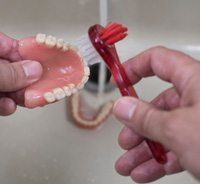
You should have a thorough nightly cleaning routine for your dentures. First, take them out of your mouth. Then, use a soft brush (preferably one that is designed specifically for use on dentures) to clean all their surfaces. You can use mild, unpigmented soap or denture cleaner during this routine. Be sure you thoroughly rinse your dentures before wearing them again; you do not want to put any soapy residue in your mouth.
Keep Your Dentures Safe
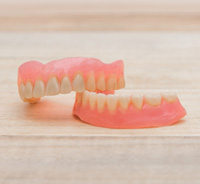
Mishaps could easily damage your dentures, so it is important that you take steps to keep them safe. For example, you should always store them where they will not be easily reached by small children or curious pets. Additionally, you should be sure to handle them gently when you take them out of your mouth. Many people choose to stand over a folded towel or a sink full of water so their dentures will have a soft landing if they accidentally get dropped.
Remove When You Sleep
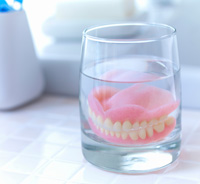
While you might be tempted to wear your dentures 24/7, that is not a good idea. You should remove them every night at bedtime so your gums can breathe for several hours while you sleep. This allows for improved circulation and reduces the risk gum sores and other issues. Plus, removing your dentures makes it much easier to clean both them and your oral tissues.
You should store your dentures in water or a cleansing solution overnight so they do not dry out and lose their shape.
Notice Changes

Monitoring your oral health and your dentures is a key to identifying problems before they become serious. Be sure to notice things like gum irritation, sores, bad breath, and other potential signs of oral infections. You should also make note of changes to the way your dentures fit, feel, or look. If there is any visible damage or other causes for concern, you should visit our practice to see if they can be repaired.
All-on-4 Dentures
All-on-4 dentures are not removable like a traditional prosthetic. Therefore, caring for them is a bit different. You should brush them regularly with a soft brush and non-abrasive toothpaste. You also need to floss beneath your dentures. You can use a floss threader or water flosser to accomplish this. You might also try using an affordable device called a sulcus brush.
Just like with traditional dentures, you should keep an eye on your All-on-4 restoration and report changes to our dental team without delay.
Denture FAQs

Are you thinking about getting dentures? Our Auburn dental team is ready to help you through the process of rebuilding your smile. In the meantime, you may want to learn more about the road ahead. To assist you, we have put together the following list of frequently asked questions regarding dentures. If you do not see the specific information you were looking for, feel free to reach out to us directly.
How Long Will You Have to Wait to Get Dentures After Your Teeth Are Pulled?
There are a few different possibilities:
- If you get immediate dentures, your prosthetic will be prepared before your teeth get extracted. You will be able to start using it right away after tooth removal. However, it will need more frequent adjustments than a conventional denture.
- If you get conventional dentures, you may need to wait 6 – 8 weeks after your extractions before you get your new teeth. This waiting period gives the gums times to heal.
- If you get traditional implant dentures, it could be several months before your new smile is complete. You will have to wait while your prosthetic tooth roots bond with your jawbone.
- If you choose All-on-4 implant dentures, you will receive a provisional denture on the same day as your extractions and your implant placement surgery.
What Is the Average Age for Dentures?
Tooth loss is much more common among older individuals. A census conducted by the American Dental Association found that nearly 57% of people aged 65 – 74 wear some form of denture. Of course, there is no shame in getting dentures much earlier than that. Due to trauma, genetics, disease, or other factors, some people as young as their 20s or late teens require tooth replacement.
Will It Hurt to Get Dentures?
If you have to undergo tooth extractions prior to getting dentures, you can expect some soreness after your procedure. Using pain medication and getting plenty of rest should help to take the edge off of your discomfort.
When you first receive your new teeth, some irritation and tenderness are normal. After an adjustment period, which may take a few months, you can expect your prosthetic to fit comfortably. If it ever causes any severe pain or irritation, you should ask your dentist for guidance.
Can I Sleep with My Dentures?
When you first get your dentures, you may be directed to wear them continuously for the first 24 hours. Thereafter, though, you should remove them each night. This allows your gums to rest and provides an opportunity for you to thoroughly clean your prosthetic. You can thereby reduce your risk of sores, bad breath, infections, and other problems.
If you would like to have your teeth in your mouth 24/7, ask your denture dentist if you are a candidate for implant dentures.
Should I Have All My Teeth Pulled to Get Dentures?
Whenever possible, we try to preserve damaged teeth rather than replace them. Therefore, if your teeth are still viable, we may provide restorative treatments to strengthen them and renew their function and appearance. A partial denture can fit in around them to fill any existing gaps in your smile.
On the other hand, if your natural teeth are in poor condition, or gum disease has significantly compromised their base of support, we may decide that extracting them is the most practical thing to do. Then, you may be able to receive full dentures.
Is It Hard to Talk with Dentures?
When you first receive your dentures, it may take some time to get used to speaking with them. You might notice a lisp, or you may have to speak slowly in order to enunciate your words clearly.
With practice, such speech issues should go away. Try reading out loud to yourself to practice pronouncing challenging words. You might also decide to use denture adhesive to keep your prosthetic in place while you are learning to talk with it.
Most people find that within a few weeks or so, they are able to speak with more clarity and confidence than they did before getting their prosthetic teeth.
What Can You Not Eat with Dentures?
While dentures can allow you to eat a wide variety of foods, there are some items that you should be very cautious about consuming:
- Sticky foods, like peanut butter and gummy candies, might pull your dentures out of place.
- Foods that contain small pieces, like popcorn, nuts, and seeds, might get stuck in and around your dentures, leading to irritation, hygiene issues, and possible damage to your prosthetic.
- Hard foods, like whole apples, raw carrots, or corn on the cob should be cut into small pieces before you try to eat them. Dentures should never be used to bite directly into them.
- Foods that require a lot of chewing, such as tough meats, can place stress on both your dentures and your gum tissue.
Why Do My Dentures Smell?
A bad smell might be due to any number of reasons. For example, if your denture does not fit well, bacteria and food particles are more likely to sneak beneath it, which could lead to unpleasant odors. Missteps in oral hygiene, smoking, and certain pungent foods could also contribute to smells.
To keep your denture fresh, make sure that you have a thorough daily oral hygiene routine. Brush all of your prosthetic’s surfaces, and regularly soak it in a cleansing solution. If it does not fit correctly, ask our team about getting it relined (adjusted). You should also bear in mind the importance of quitting bad habits like smoking and other forms of tobacco use.
